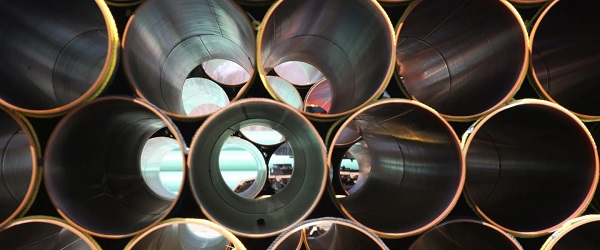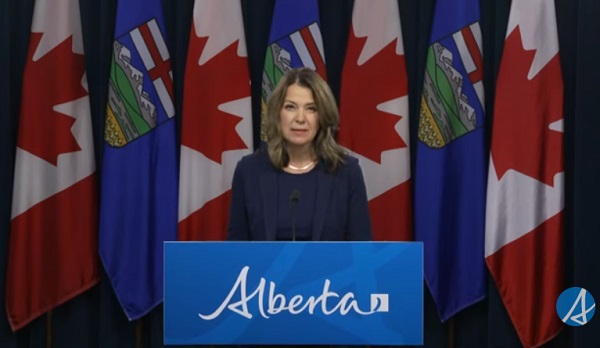Energy
Canadian natural resource minister’s wife invests in oil stocks as gov’t attacks industry

From LifeSiteNews
Records show Tara Wilkinson’s stock purchases include ‘fossil fuel’ producers targeted for eventual elimination by the Liberal government.
The wife of Canadian Natural Resources Minister Jonathan Wilkinson bought oil and gas company stocks, records show, at the same time the federal Liberal government has been attacking the industry in a bid to curb so-called “fossil fuel” use and “fight against climate change.”
According to records as per a recent Blacklock’s Reporter report, Wilkinson’s wife, Tara, amped up her trading in oil and gas stocks last year in Enbridge Incorporated and Shell PLC. The records were found filings under Canada’s Conflict of Interest Code for Members of the House of Commons.
Records show Mrs. Wilkinson also has shares in the globalists linked BlackRock Inc., Amazon, and Finning International Inc., the military-industrial complex linked to Lockheed Martin Corporation, along with COVID jab promoting Pfizer and 3M Company. She also holds stock in Royal Bank and Toronto Dominion Bank.
As early as December, Wilkinson boasted that “Canada became the first oil and gas producer in the world to put a cap on oil and gas emissions.”
He also has claimed that he is looking out for his family’s future by promoting federal climate programs.
Indeed, in 2021, he said he would “honour the commitments we made to our children that we’re going to leave them something that is a workable and sustainable world,” claiming “climate change” is the “existential issue of our time.”
He also claimed, despite his wife and by extension family profiting off oil and gas companies, that “we are on a trajectory to reducing to net zero by 2050” and that “it is important in our fight against climate change.”
Other current and former Liberal cabinet ministers also have oil and gas stocks, such as former Addictions Minister Carolyn Bennett, former Attorney General David Lametti and current Veterans Affairs Minister Ginette Petitpas Taylor.
Oil and gas companies have been racking in high profits due to both a high demand for oil and gas and higher oil prices.
The federal government under Prime Minister Justin Trudeau since 2015 has pushed a radical environmental agenda similar to the agendas being pushed the World Economic Forum’s “Great Reset” and the United Nations “Sustainable Development Goals.”
Late last year, the Trudeau government forged ahead with many policies that if they come to full fruition will destroy Canada’s oil and gas industry, which provides jobs to thousands and is important in Alberta and Saskatchewan.
At COP28 held late last year, Environment Minister Steven Guilbeault unveiled a plan to slash oil and gas emissions by 35% to 38% below 2019 levels. He claimed that it is important to reach “carbon neutrality in Canada by 2050.”
At COP28, he announced a new Liberal federal government climate policy that aims to incentivize beef cattle ranchers to reduce how much gas their cows emit by giving them feed additives.
A recent near power blackout in Alberta due to the failure of wind and solar power, however, highlights how so-called sustainable wind and solar power, which the Trudeau government heavily promotes, are not a good fit for Canada’s cold climate.
Alberta Premier Danielle Smith has blasted Guilbeault as a “menace” for going after her province and the oil and gas industry in general and vowed to fight him with every tool available to her government.
The Trudeau government has also pledged to mandate that all new cars and trucks by 2035 be electric, which would in effect ban the sale of new gasoline- or diesel-only powered vehicles after that year.
The reduction and eventual elimination of the use of so-called “fossil fuels” and a transition to unreliable “green” energy has also been pushed by the World Economic Forum (WEF) – the globalist group behind the socialist “Great Reset” agenda – an organization in which Trudeau and some of his cabinet are involved.
A June 2017 peer-reviewed study by two scientists and a veteran statistician confirmed that most of the recent global warming data have been “fabricated by climate scientists to make it look more frightening.”
There have been two recent court rulings that have dealt a blow to Trudeau’s environmental laws, however.
The most recent was the Federal Court of Canada on November 16 overturned the Trudeau government’s ban on single-use plastic, calling it “unreasonable and unconstitutional.”
The second ruling comes after Canada’s Supreme Court recently sided in favor of provincial autonomy when it comes to natural resources. The Supreme Court recently ruled that Trudeau’s law, C-69, dubbed the “no-more pipelines” bill, is “mostly unconstitutional.” This was a huge win for Alberta and Saskatchewan, which challenged the law in court. The decision returned authority over the pipelines to provincial governments, meaning oil and gas projects headed up by the provinces should be allowed to proceed without federal intrusion.
The Trudeau government, however, seems insistent on defying the recent rulings by pushing forward with its various regulations.
Energy
B.C. premier’s pipeline protestations based in fallacy not fact

From the Fraser Institute
The latest war of words over a pipeline in Canada is between Alberta Premier Danielle Smith, who seeks the construction of a pipeline from Alberta’s oilsands to export facilities on the Pacific coast, and British Columbia Premier David Eby who is foursquare against it.
Smith argues the pipeline is needed to break the U.S. market-lock on Alberta oil, which the United States buys at a discount compared to world prices. Smith argues that increased trade in oil and gas—at higher prices—would be good for Alberta’s economy and Canada’s national economy, and can be done while protecting the environment in both provinces. Eby denies virtually all these claims.
More specifically, Premier Eby makes four arguments against a new pipeline, and all are incorrect.
First, he argues, any pipeline would pose unmitigated risks to B.C.’s coastal environment. But in reality, the data are clear—oil transport off Canada’s coasts is very safe (since the mid-1990s there has not been a single major spill from oil tankers or other vessels in Canadian waters). He also simultaneously argues that it’s pointless to build a new pipeline from Alberta because B.C.’s waters are protected by Bill C-48, the “tanker ban” bill enacted by the Trudeau government in 2017. But in fact, because Bill C-48 only applies to Canadian tankers, a regular stream of oil tankers and large fuel-capacity ships cruise up and down the B.C. coast (between Alaska and other U.S. ports) with stupendous safety records.
Second, Eby argues that B.C.’s First Nations oppose any such pipeline. But in reality, such opposition is quite contingent. The Trans Mountain pipeline expansion project (TMX), which has increased shipping capacity from Alberta to the west coast, has signed agreements with 81 Indigenous community groups (in both provinces) worth $657 million and produced more than $4.8 billion in contracts with Indigenous businesses.
Third, Eby claims that Smith’s proposal is not “real” because no private-sector companies have proposed to build the pipeline. And he’s partly right—no rational investor would look at the regulatory barricade facing pipeline construction and spend the time and money to propose a project. Those applications cost money and lots of it. In 2017, according to TC Energy,before it retracted its Energy East/Eastern proposals due largely to regulatory barriers, the company had spent more than C$1 billion trying to get permits. In a 2016 report, Enbridge listed pre-construction expenditures (which include crafting proposals) of up to US$1.5 billion to build its three proposed pipeline projects. These costs will not have gotten cheaper since then. But even so, the Alberta government’s pipeline proposal has the backing of an advisory group, which includes energy companies Enbridge, Trans Mountain and South Bow—likely because they want to invest in the project after there’s some assurance it will survive the regulatory blockade.
Finally, Eby’s claim that there’s no market demand for new pipelines (which implies there will be no investors) is unsubstantiated. According to S&P Global, Canadian oilsands production will reach a record annual average of 3.5 million barrels of oil per day (b/d) in 2025, five per cent higher than 2024. By 2030, production could top 3.9 million b/d, 500,000 b/d higher than 2024 (although this assumes the federal cap on emissions, imposed by the Trudeau government, does not curtail production as predicted). This profit potential will almost certainly attract investors, if they can overcome the regulatory blockade.
It’s fine, of course, for Premier Eby to look out for the people of B.C. as best he sees fit—that’s his job, after all. But it’s also his job to recognize the limits of his authority. When looking at the TMX project, the Supreme Court of Canada has already ruled that B.C. does not have the authority to block infrastructure of national importance, including pipelines.
But as the saying goes, you’re entitled to your own opinion but not entitled to your own facts. Premier Eby’s objections to another Alberta pipeline are rooted in fallacy, not fact. The Carney government should recognize this fact and decide whether or not another pipeline to B.C. waters is in the “national interest,” which is apparently how you get a permit to build major projects in Canada these days.
Carbon Tax
Back Door Carbon Tax: Goal Of Climate Lawfare Movement To Drive Up Price Of Energy


From the Daily Caller News Foundation
The energy sector has long been a lightning rod for policy battles, but few moments crystallize the tension between environmental activism and economic reality quite like David Bookbinder’s recent admission. A veteran litigator who’s spent years spearheading lawsuits against major oil companies on behalf of Colorado municipalities — including Boulder — Bookbinder let the cat out of the bag during a recent Federalist Society panel.
In an all-too-rare acknowledgement of the lawfare campaign’s real goal, Bookbinder admitted that he views the lawsuits mainly as a proxy for a carbon tax. In other words, the winning or losing of any of the cases is irrelevant; in Bookbinder’s view, the process becomes the punishment as companies and ultimately consumers pay the price for using oil and gas and the industry’s refined products.
“Tort liability is an indirect carbon tax,” Bookbinder stated plainly. “You sue an oil company, an oil company is liable. The oil company then passes that liability on to the people who are buying its products … The people who buy those products are now going to be paying for the cost imposed by those products. … [This is] somewhat of a convoluted way to achieve the goals of a carbon tax.”
Dear Readers:
As a nonprofit, we are dependent on the generosity of our readers.
Please consider making a small donation of any amount here.
Thank you!
The cynicism is so thick you could cut it with a knife.
On one hand, the fact that winning is irrelevant to the plaintiff firms who bring the cases has become obvious over the last two years as case after case has been dismissed by judges in at least ten separate jurisdictions. The fact that almost every case has been dismissed on the same legal grounds only serves to illustrate that reality.
Bookbinder’s frank admission lands with particular force at a pivotal juncture. In late September, the Department of Justice, along with 26 state attorneys general and more than 100 members of Congress, urged the Supreme Court to grant certiorari in one of the few remaining active cases in this lawfare effort, in Boulder, Colorado.
Their briefs contend that allowing these suits to proceed unchecked would “upend the constitutional balance” between federal and state authority, potentially “bankrupt[ing] the U.S. energy sector” by empowering local courts to override national energy policy.
For the companies named in the suits, these cases represent not just a tiresome form of legal Kabuki Theater, but a financial and time sink that cuts profits and inhibits capital investments in more productive enterprises. You know, like producing oil and gas to meet America’s ravenous energy needs in an age of explosive artificial intelligence growth.
“I’d prefer an actual carbon tax, but if we can’t get one of those, and I don’t think anyone on this panel would [dis]agree Congress is likely to take on climate change anytime soon—so this is a rather convoluted way to achieve the goals of a carbon tax,” Bookbinder elaborated in his panel discussion.
John Yoo, the eminent UC Berkeley law professor and former Bush-era official, didn’t hold back in his analysis for National Review. He described the lawfare campaign as a “backdoor” assault on the energy industry, circumventing the federal government’s established role in environmental regulation.
“There are a variety of cities and states that don’t agree with the federal government, and they would like to see the energy companies taxed,” Yoo explained. “Some of them probably like to see them go out of business. Since they can’t persuade through the normal political process of elections and legislation like the rest of the country, they’re using this back door,” he added.
What we see in action here is the fact that, although the climate alarm industry that is largely funded by an array of dark money NGOs and billionaire foundations finds itself on the defensive amid the aggressive policy actions of the Trump 47 administration, it is far from dead. Like the Democrat party in which they play an integral role, the alarmists are fighting the battle in their last bastion of power: The courts.
As long as there are city and county officials willing to play the role of plaintiffs in this long running Kabuki dance, and a Supreme Court unwilling to intercede, no one should doubt that this stealth carbon tax lawfare effort will keep marching right along.
-

 Agriculture2 days ago
Agriculture2 days agoFrom Underdog to Top Broodmare
-

 Health2 days ago
Health2 days agoSovereignty at Stake: Why Parliament Must Review Treaties Before They’re Signed
-

 Business2 days ago
Business2 days ago$15B and No Guarantees? Stellantis Deal explained by former Conservative Shadow Minister of Innovation, Science and Technology
-

 Alberta1 day ago
Alberta1 day agoPremier Smith moves to protect Alberta in International Agreements
-

 DEI1 day ago
DEI1 day agoConservative push to end Canada’s ‘anti-merit’ DEI programs receives support
-

 Business1 day ago
Business1 day agoLiberals backtrack on bill banning large cash gifts, allowing police to search Canadians’ mail
-

 Health1 day ago
Health1 day agoFor Anyone Planning on Getting or Mandating Others to Get an Influenza Vaccine (Flu Shot)
-

 Sports1 day ago
Sports1 day ago‘We Follow The Money’: Kash Patel Says Alleged NBA Ties To Mafia Just ‘The Start’ Of FBI Investigation








